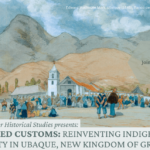
The History Faculty New Book Series presents:
The Sword and the Shield: The Revolutionary Lives of Malcolm X and Martin Luther King Jr.
(Basic Books, 2020)
A book talk and discussion with:
Peniel E. Joseph
Barbara Jordan Chair in Ethics and Political Values, LBJ School of Public Affairs, Professor of History, and Founding Director Center for the Study of Race and Democracy, The University of Texas at Austin
https://liberalarts.utexas.edu/history/faculty/pej335
This talk took place on September 17, 2020.
This dual biography of Malcolm X and Martin Luther King upends longstanding preconceptions to transform our understanding of the twentieth century’s most iconic African American leaders.
To most Americans, Malcolm X and Martin Luther King Jr. represent contrasting ideals: self-defense vs. nonviolence, black power vs. civil rights, the sword vs. the shield. The struggle for black freedom is wrought with the same contrasts. While nonviolent direct action is remembered as an unassailable part of American democracy, the movement’s militancy is either vilified or erased outright. In The Sword and the Shield, Peniel E. Joseph upends these misconceptions and reveals a nuanced portrait of two men who, despite markedly different backgrounds, inspired and pushed each other throughout their adult lives. This is a strikingly revisionist biography, not only of Malcolm and Martin, but also of the movement and era they came to define.
“Mr. Joseph, a history professor at the University of Texas at Austin, weaves [Martin Luther King Jr. and Malcolm X’s] stories fluidly and with vivid detail, helping to strip away the high gloss of mythology.”
—Wall Street Journal
“Joseph’s fresh and perceptive dual biography may rekindle political unity in a time of increasingly granular identity politics, sensationalism, and fear.”
—Booklist
“It is a fascinating story, full of subtle twists and turns.”—Washington Post
“As the author delineates the philosophies and tactics of each man, he compares and contrasts them on nearly every page, making the various narrative strands cohere nicely. An authoritative dual biography from a leading scholar of African American history.”
—Kirkus
Peniel Joseph holds a joint professorship appointment at the LBJ School of Public Affairs and the History Department in the College of Liberal Arts at The University of Texas at Austin. He is also the founding director of the LBJ School’s Center for the Study of Race and Democracy (CSRD). His career focus has been on “Black Power Studies,” which encompasses interdisciplinary fields such as Africana studies, law and society, women’s and ethnic studies, and political science.
Prior to joining the UT faculty, Dr. Joseph was a professor at Tufts University, where he founded the school’s Center for the Study of Race and Democracy to promote engaged research and scholarship focused on the ways issues of race and democracy affect people’s lives.
In addition to being a frequent commentator on issues of race, democracy and civil rights, Dr. Joseph’s most recent book is The Sword and the Shield: The Revolutionary Lives of Malcolm X and Martin Luther King Jr.. He also wrote the award-winning books Waiting ‘Til the Midnight Hour: A Narrative History of Black Power in America and Dark Days, Bright Nights: From Black Power to Barack Obama. His book Stokely: A Life has been called the definitive biography of Stokely Carmichael, the man who popularized the phrase “black power.” Included among Joseph’s other book credits is the editing of The Black Power Movement: Rethinking the Civil Rights-Black Power Era and Neighborhood Rebels: Black Power at the Local Level.
More from Dr. Joseph on Not Even Past
- Stokely Carmichael: A Life
- Muhammad Ali helped make black power into a global brand
- 15 Minute History Episode 90: Stokely Carmichael: A Life
- Watch: “The Confederate Statues at UT”
- The Sword and the Shield – A Conversation with Peniel E. Joseph (Part I)
- The Sword and The Shield – A Conversation with Peniel E. Joseph (Part II)
The views and opinions expressed in this article or video are those of the individual author(s) or presenter(s) and do not necessarily reflect the policy or views of the editors at Not Even Past, the UT Department of History, the University of Texas at Austin, or the UT System Board of Regents. Not Even Past is an online public history magazine rather than a peer-reviewed academic journal. While we make efforts to ensure that factual information in articles was obtained from reliable sources, Not Even Past is not responsible for any errors or omissions.


